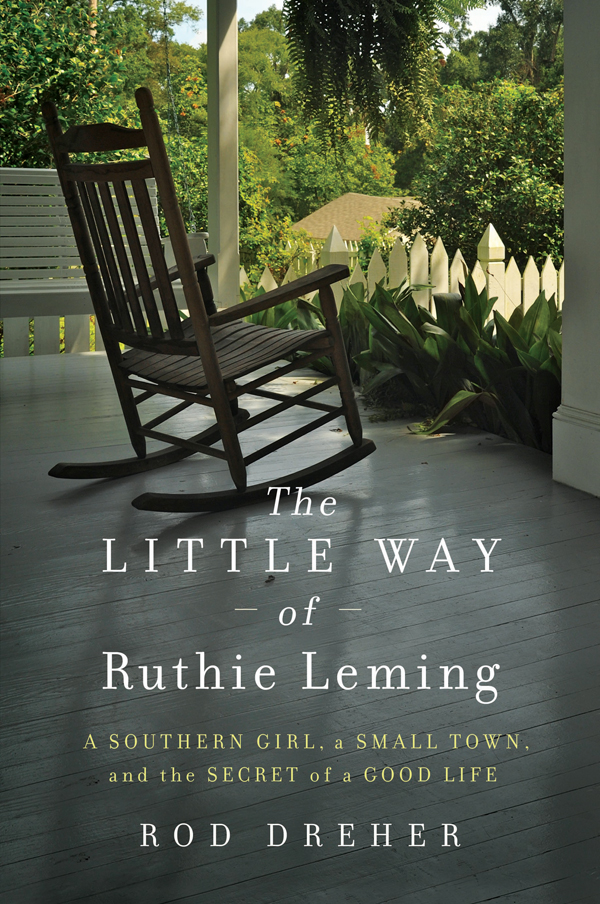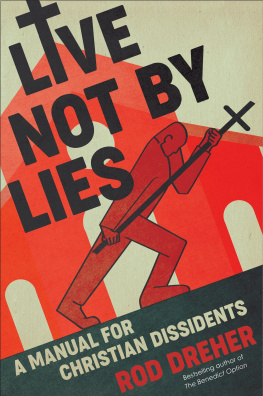
In accordance with the U.S. Copyright Act of 1976, the scanning, uploading, and electronic sharing of any part of this book without the permission of the publisher constitute unlawful piracy and theft of the authors intellectual property. If you would like to use material from the book (other than for review purposes), prior written permission must be obtained by contacting the publisher at permissions@hbgusa.com. Thank you for your support of the authors rights.
Thank you for buying this e-book, published by Hachette Digital.
To receive special offers, bonus content, and news about our latest e-books and apps, sign up for our newsletters.
Sign Up
Or visit us at hachettebookgroup.com/newsletters
Copyright 2013 by Rod Dreher
All rights reserved. In accordance with the U.S. Copyright Act of 1976, the scanning, uploading, and electronic sharing of any part of this book without the permission of the publisher constitute unlawful piracy and theft of the authors intellectual property. If you would like to use material from the book (other than for review purposes), prior written permission must be obtained by contacting the publisher at permissions@hbgusa.com. Thank you for your support of the authors rights.
Grand Central Publishing
Hachette Book Group
237 Park Avenue, New York, NY 10017
www.hachettebookgroup.com
www.twitter.com/grandcentralpub
First e-book edition: April 2013
Grand Central Publishing is a division of Hachette Book Group, Inc.
The Grand Central Publishing name and logo is a trademark of Hachette Book Group, Inc.
The publisher is not responsible for websites (or their content) that are not owned by the publisher.
The Hachette Speakers Bureau provides a wide range of authors for speaking events. To find out more, go to www.hachettespeakersbureau.com or call (866) 376-6591.
Lines from Charles Pguys poem The Portal of the Mystery of Hope come from a 1996 translation from the original French by David L. Schindler Jr. and are used with the permission of William B. Eerdmans Publishing Company.
All photographs are courtesy of the Dreher family, unless noted otherwise.
ISBN 978-1-4555-2190-6
To Hannah, Claire, and Rebekah
This is your mother; these are your people
What matters in life are not great deeds, but great love.
ST. THRSE OF LISIEUX
H eres the thing I want you to know about my sister.
A long time agoI must have been about seven years old, which would have made Ruthie fiveI did something rotten to her. What it was, I cant remember. I teased her all the time, and she spent much of her childhood whaling the tar out of me for it. Whatever happened that time, though, must have been awful, because our father told me to go lie down on my bed and wait for him. That could mean only one thing: that he was going to deliver one of his rare but highly effective spankings, with his belt.
I cannot recall what my offense was, but I well remember walking down the hallway and climbing onto the bed, knowing full well that I deserved it. I always did. Nothing to be done but to stretch out, facedown, and take what I had coming.
And then it happened. Ruthie ran into the bedroom just ahead of Paw and, sobbing, threw herself across me.
Whip me! she cried. Daddy, whip me!
Paw gave no spankings that day. He turned and walked away. Ruthie left too. There I sat, on the bed, wondering what had just happened.
Forty years later, I still do.

Ruthie would grow up to be a schoolteacher, a friend, a neighbor, and quite possibly the kindest person many people in our Louisiana parish had ever met. But our little town, St. Francisville, suffers no lack of kind people. There was something different about Ruthie, though. I didnt always see that, of courseand I didnt really see it until the end. Ruthie had always been my little sister, which, in our family, meant my frequent foil.
My little sister was born on May 15, 1969. My parents named her Lois Ruth Dreher, accomplishing the neat trick of honoring four elderly female relatives with only two names. As far as I was concerned at the time, the kid ruined my life as a two-year-old prince of the realm. When Mam and Paw brought her home from the hospital to our house in the country, I was appalled. Ruthie had a crib in her own room, across the hall from mine. That was too close.
When she had been home from the hospital for about two weeks, I told my parents, I dont want her.
Okay, well take her back, replied Mam. She loaded Ruthie in the car after making a show of packing up a little suitcase. Then Mam put me in the car and started to drive, wondering how far wed have to go before I gave in. We got all the way to Highway 61 before I started crying and said that I wanted her. My baby, my baby, I cried. Crisis averted, Mam turned the car around and headed for home. But I was still jealous and would remain so for some time.
This scenario or some variation of it should be familiar to anyone who has been a sibling or raised siblings. But as time went onand not much time, eitherit became clear that Ruthie and I were so different it was hard to imagine that we came from the same family.
The Drehers were country people. We lived in Starhill, a rural community six miles south of St. Francisville, a town of two thousand souls and the county seat of West Feliciana Parish. Though our little red brick house wouldnt have been out of place anywhere in late 1960s suburban America, it had the intimidating distinction of being smack in the middle of plantation country, a land of magnolias, Spanish moss, and architectural grandeur. West Feliciana is in English Louisiana, a southeastern region settled by people of Anglo descent, some of them Tories escaping the American Revolution. They built magnificent cotton plantations, and sold their goods at Bayou Sara, a trading port on the Mississippi, just below the bluffs on which the town of St. Francisville was built.
Growing up in St. Francisville you cant escape history. Every schoolchild goes on a field trip to Grace Episcopal Church, and stands under the moss-strewn oaks to hear the story of the time a cannonball from a Union gunboat on the river struck the churchs bell tower. Our ancestor Columbus Simmons fought as a Confederate sniper in the battle of Port Hudson. For eleven days, he lived in a hollow tree, eating grubs, his legs peppered by shrapnel, until his capture. After the battle the Yankees let their prisoners go, and he limped back to his home in Osyka, Mississippi, and rejoined the Rebel army. Later Columbus migrated to West Feliciana, bought land in Starhill, and raised his family there. His children were George; Clint; my great-grandmother, Bernice; and her two younger sisters, Lois and Hilda. My sister and I learned about Columbus as a small boy at Loiss and Hildas ancient knees. Thats how close history was to Ruthie and me.
My father, Ray Dreher, was the first in our branch of the family to go to college, though against his will. He wanted to be outside, building things and working with his cows. But after returning from a stint in the US Coast Guard, my grandmother Lorena insisted that her son take advantage of the GI Bill and enter Louisiana State University. In 1958, while working on a degree in rural sociology, Paw bought sixty-seven acres in Starhill from his great-aunt Emthe asking price was forty dollars an acreand began small-scale farming on part of the old Simmons place. He also started a job as the parish sanitarian, which, in a rural parish like West Feliciana, meant he was not only the health inspector, but often the public official who helped impoverished families get basic plumbing into their houses. To look upon my father as a young manfreckled forearms, sun-scorched face, chest the size of an oak trunk, fiery orange cowlicks blazing atop his headwas to understand immediately that he was a man who had no business confined to a desk. It wasnt in his nature.
Next page











